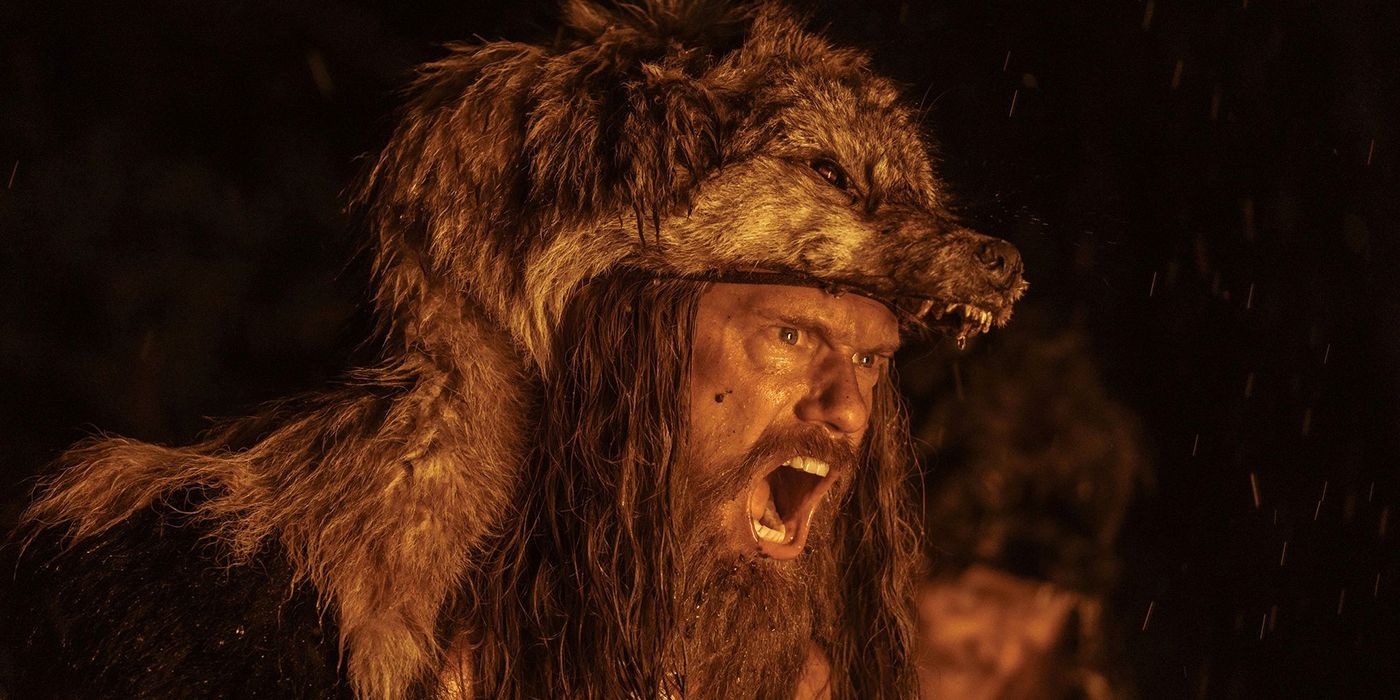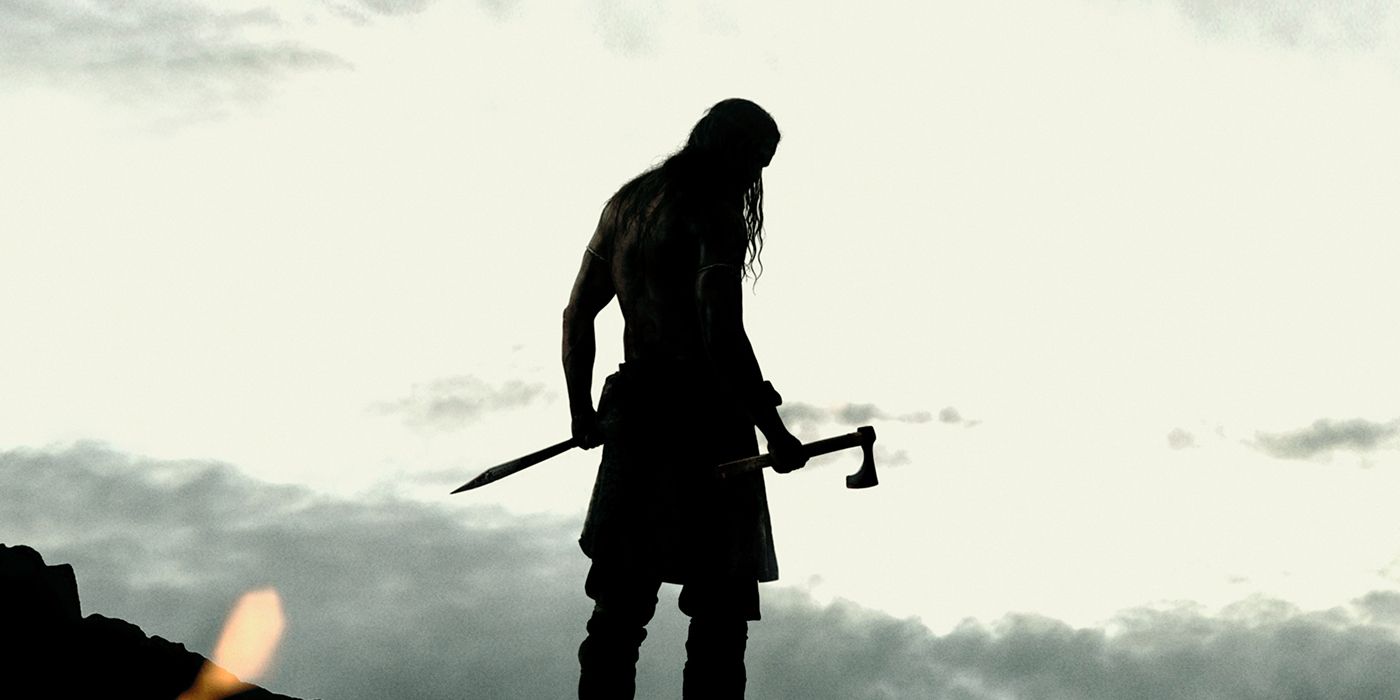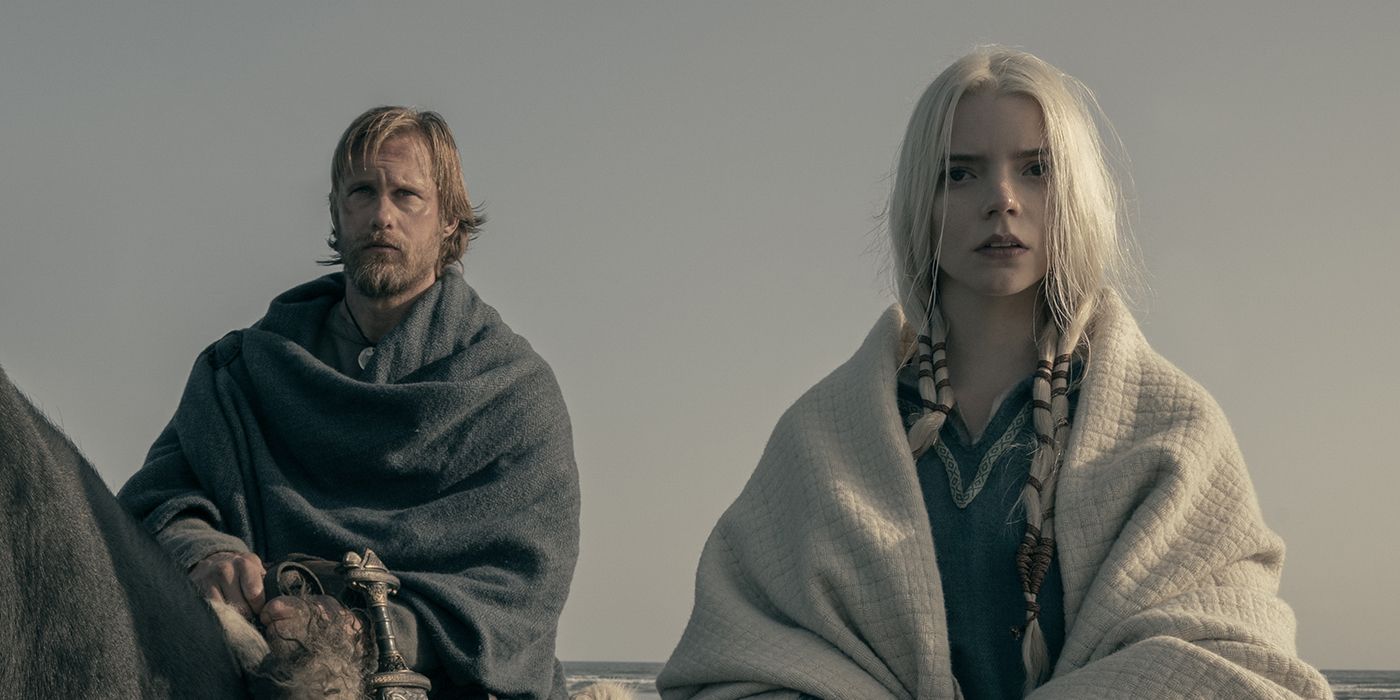Robert Eggers likes to explore the uncertainty of horrifying situations, whether through religion and doubt in 2015’s The Witch, or questioning one’s own sanity in 2019’s The Lighthouse. Eggers told both of these stories on a relatively small scale, mostly limited to a secluded house on the edge of the woods, or a claustrophobic lighthouse so small that even the lead character hits his head on the film’s aspect ratio. These confines have helped make Eggers such an effective filmmaker, and turned him into an orchestrator of these small-scale nightmares. Yet while witches and mermaids—as well as the fear of the world not making sense anymore—have plagued the characters in Eggers’ films, it’s that uncertainty that creeps in and gets under his character’s skins that makes Eggers’ first two films stories that are hard to shake long after they’re over.
Eggers’ third film, The Northman, however, gives the director a much larger canvas to explore, an expansive and grander vision that we’ve ever seen Eggers try to tackle before, but with that uncertainty still in tact and just as effective as ever. Co-written by Eggers and Sjón, The Northman follows the Viking warrior prince Amleth (Alexander Skarsgård) on his journey for vengeance. As a child, Amleth saw his father, King Aurvandill (Ethan Hawke), murdered by his uncle Fjölnir (Claes Bang). After witnessing the slaying of his father, Amleth swore to avenge his father, save his mother, Queen Gudrún (Nicole Kidman)—who was kidnapped by Fjölnir’s men—and kill Fjölnir.
The Northman at first feels distinctly like Eggers’ work in its strangeness, be it through characters like Willem Dafoe’s Heimir the Fool, or the unsettling nature of the time, when royalty can become slaves at any moment, and violence seems around every corner. But as The Northman progresses, Eggers’ penchant for uncertainty once again seeps into his story, as Amleth’s quest for revenge becomes full of skepticism. Yet in this uncertainty comes Eggers’ most focused theme to date, as Eggers and Sjón explore how evil begets evil, and how even the most black-and-white scenarios are full of gray. The Northman ultimately becomes a story about embracing love, compassion, and forgiveness, or falling to the more base desires of retribution.
Like all of Eggers’ work, The Northman has an inherent haunting quality to it. When we first see the adult Amleth, he’s more of an animal than a man. As Amleth and his team murder and pillage their way through a small village, Skarsgård almost presents himself like a beast, with hunched shoulders and a determination to kill anything that gets in his way. Even if at this early point, Amleth has tried to ignore his royal lineage, we can see the deep-seated rage that has lived in this man for decades. Eggers shoots this invasion almost like a combination between a horror film and Elem Klimov’s terrifying anti-war film, Come and See. Eggers shows our protagonist as an adult, then immediately reveals that his actions since we last saw him have been as bad—if not worse—than the actions of his murdering uncle.
Based on the Scandinavian legend of Amleth, who was William Shakespeare’s inspiration for Hamlet, The Northman isn’t exactly reinventing the Viking story, but instead, taking familiar elements and making them feel shocking and new through Eggers’ camera. As Amleth continues towards his goal, Eggers, along with cinematographer Jarin Blaschke—who has shot Eggers’ previous features—amp up the terrors. The anger starts to overcome Amleth, and we can see this through the wake he leaves behind him. Again, Eggers and Sjón aren’t necessarily doing much groundbreaking narratively, yet the determination to show the dread and panic of that period and in such a situation makes The Northman one of the more staggering Viking tales in recent memory.
Another key element that makes Eggers’ films so outstanding is capturing fantastic performances amongst his terrors, and that certainly remains true in The Northman. Skarsgård is remarkable as Amleth, showing the audience exactly what this character is thinking through nothing more than his sheer physicality. It’s almost as if Skarsgård is playing Amleth as a werewolf, transforming when the desire for blood becomes too much to bear. Balancing out Amleth’s fury is Olga (Anya Taylor-Joy), a sorceress who helps Amleth on his goal. As Olga says early on, Amleth can break men’s bodies, but she can break men’s minds, and similar to Amleth, we can see when Olga’s rage gets the better of her through the way she presents herself. Skarsgård and Taylor-Joy are tremendous together, a pairing that both needed, lest they succumb fully to the anger that rages inside them.
Beyond this pair, The Northman is packed with phenomenal performances, most of which are seen through the unreliable viewpoint of Amleth. Particularly brilliant are Kidman and Bang, in roles that almost require a second viewing to appreciate fully. Bang as Fjölnir is giving a quiet, reserved performance that shows a man trying to do the best with what he has left, whereas Kidman also plays Queen Gudrún with restraint, but Kidman’s opportunity to go all-in with the resentment within this character is one of The Northman’s best scenes.
Yet, if there’s one thing The Northman is missing from the rest of Eggers’ oeuvre, it is that lack of madness that made parts of The Witch and The Lighthouse almost feel like a catharsis. By the end of The Witch, Eggers provided that moment of embracing the hysteria of this situation, while The Lighthouse almost made an entire film around this feeling. But that part of Eggers’ sensibility is mostly absent here, occasionally popping up during The Northman’s most fantastical moments. It’s not a damning absence, but it does feel like The Northman could’ve integrated that insanity a bit more into this tale as well.
But mostly, it’s exciting to see Eggers working on this scale and thriving. Eggers’ style and striking imagery work beautifully within a story this sweeping and grandiose, and even on a larger scale, Eggers can still craft a film that feels oppressive in just the right ways. While this is Eggers’ least horror-centric story, he still utilizes many of the same techniques to engross the audience in the foreboding that this period must have induced in the people of that time. There are few filmmakers that can make the leap from smaller, insular stories into large-scale epics, but with The Northman, Eggers has proved that his style and substance can remain intact, regardless of the size of the story.
Rating: B+
The Northman opens in theaters on April 22.



